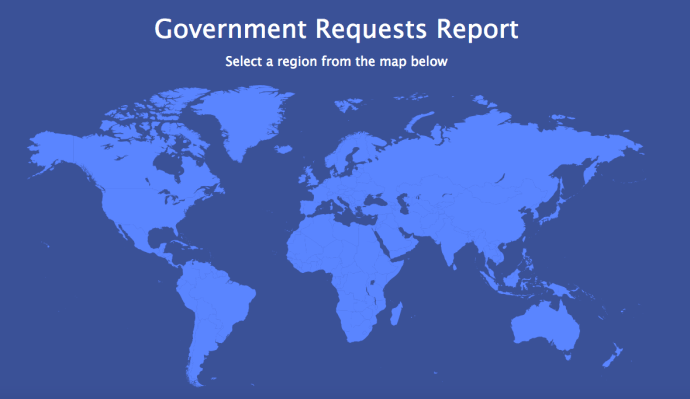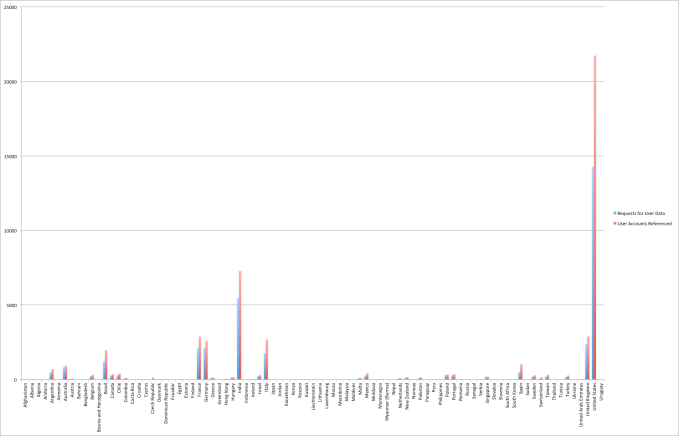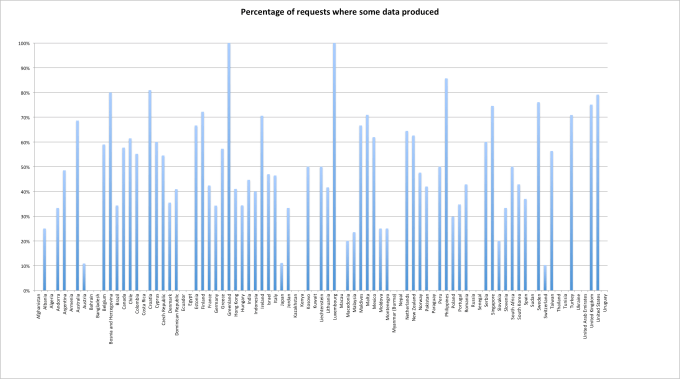Facebook’s latest report on government requests shows a decrease in requests from many Western countries in the second half of 2014, but that’s offset by increases from India, Turkey and Russia.
The total number of requests from governments received by the world’s largest social network rose from 34,946 in the first half of the year, to 35,051 between July and December 2014.
Facebook is the de facto social media in most of the world, so it’s no surprise that the site is one of the first places that authorities turn to when they seek information about individuals. Facebook disclosed that it saw 14,274 requests from the U.S. government for information about users, 79 percent of those requests saw Facebook provide data. That figure represents a slight reduction on 15,433 requests in the first half of 2014.
India was the second highest government on Facebook’s list, with 5,473 requests made during the final six months of last year. That’s perhaps unsurprising — the country’s approach to censorship was highlighted when ISPs were told to block 30 websites, including GitHub in December.
Facebook provided information in just 45 percent of those cases in India, but it did enact 5,832 cases of ‘content restriction’ in India — which might, for example, mean blocking access to a specific page or media hosted on the social network. Zero restrictions were made in the U.S. during the same period.
Requests for user data by authorities in the UK declined slightly from 2,619 in the first half of 2014, to 2,366 in the second half of the year. Facebook provided data in two-thirds of the requests, and restricted three pieces of content between July and December 2014.
Italy, Germany, Brazil and France also saw high volume of requests, although in each case the respective figures were lower in the second half of the year. Facebook said it saw a rise in Turkey and Russia, however.
“We publish this information because we want people to know the extent and nature of the requests we receive from governments and the policies we have in place to process them,” the U.S. company said in a statement.
Facebook has been accused of being in bed with authorities over surveillance but the company maintained that it will “continue to scrutinize each government request and push back when we find deficiencies.”
“We will also continue to push governments around the world to reform their surveillance practices in a way that maintains the safety and security of their people while ensuring their rights and freedoms are protected,” the company added.
Despite fighting talk, the U.S. government doesn’t allow Facebook to break out the nature of requests made to it. That means that NSA-style requests for information are counted alongside more acceptable demands for information related to criminal cases such as kidnappings and robberies. That somewhat limits the value that we can decrypt from the data, but overall it provides a starting point for assessing how governments respond to the social network.
Click the charts below to view at full size
Number of government requests made and the number of user accounts associated
Percentage of government data requests acted upon


